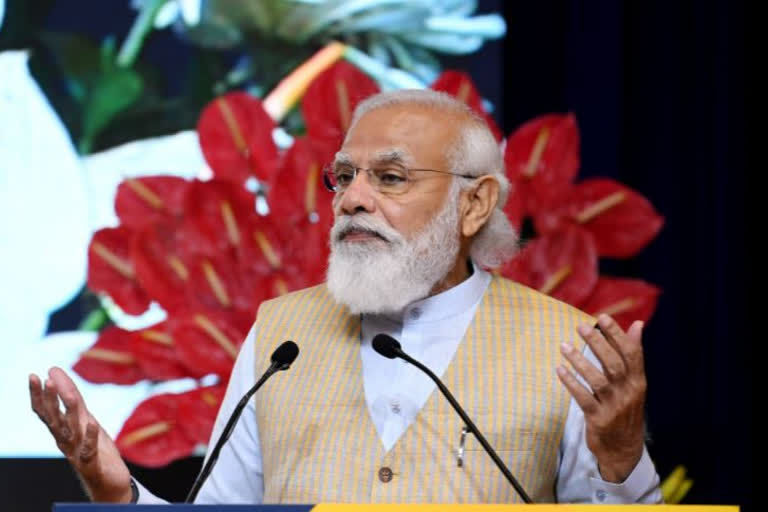Chennai: Prime Minister Narendra Modi on Wednesday inaugurated 11 government medical colleges in Tamil Nadu and said the future will belong to societies that invest in healthcare.
After virtually inaugurating the medical institutions, Modi said the Covid-19 pandemic has reaffirmed the importance of the health sector and listed out the various health and medical education related initiatives of his government.
"The once in a lifetime Covid-19 pandemic has reaffirmed the importance of the health sector. The future will belong to societies which invest in health care. The government of India has brought many reforms in the health sector," he said in his virtual address.
"Learning from the pandemic, we keep working to ensure inclusive, quality health services to all our countrymen," said.
India's Covid-19 vaccination programme was making "remarkable progress," he said, while citing the expansion of the campaign by including the 15-18 years age group and the administration of the precaution dose to persons aged 60 years and above with comorbidities.
Incidentally, at an event in neighbouring Puducherry earlier in the day, where also he had participated virtually, Modi patted the youngsters for their keenness to take the Covid jabs and lauded their role in the success of the inoculation campaign.
"The role of the youth in the success of our Covid vaccination programme is being witnessed altogether at a different level. We are seeing that the youth in the 15-18 years age group are getting themselves vaccinated at a quick pace. In such a short time, over two crore children have been vaccinated. This exemplifies the sense of responsibility in today's youth and my confidence in a bright future of the country is further strengthened," he said. The vaccination for the children of this age group was launched on January 3.
Modi further said thanks to Centre's Ayushman Bharat scheme, the poor have access to top quality and affordable health care.
Earlier, he inaugurated new medical colleges established at Virudhunagar, Namakkal, Nilgiris, Tiruppur, Tiruvallur, Nagapattinam, Dindigul, Kallakurichi, Ariyalur, Ramanathapuram and Krishnagiri districts in the state and these institutions would have a cumulative capacity of 1,450 medical seats.
Noting that it was important to address regional imbalances, Modi pointed out that two of the colleges have come up in the "aspirational districts of Ramanathapuram and Virudhunagar," where development needs require special attention. Besides, one campus has been established at the remote, hilly Nilgiris.
The government had earlier said establishment of these medical colleges was in line with the prime minister's constant endeavour to promote affordable medical education and improve health infrastructure in all parts of the country.
Also Read: PM to virtually inaugurate medical colleges in Tamil Nadu, youth festival in Puducherry
The new colleges have been set up under the centrally-sponsored scheme of establishing new medical colleges attached with existing district/referral hospital.
Over 1.5 crore people in these districts and adjoining areas would benefit from the new initiative, that has come up at an estimated Rs 4,000 crore.
By inaugurating the 11 colleges at a go, he could beat his own record of inaugurating nine medical colleges recently in Uttar Pradesh at a stroke.
Outlining his government's initiatives in the health and medical education sectors, Modi said there has been a significant increase in the number of medical colleges, All India Institutes of Medical Science (AIIMS) and UG and PG medical seats, adding, a number of reforms had been put in place to ensure transparency.
"The problem of shortage of doctors in India was well-known. But there were not enough efforts to address this problem. Perhaps vested interests also did not let previous governments take the right decisions. And, access to medical education remained an issue. Ever since we have taken office, our Government has worked to address this gap," he said.
Saying the world has taken note of Indian practices that further wellness, such as Yoga, Ayurveda and Siddha, he said, "we are working to make these popular in a language the world understands."
Modi announced a 'support' of over Rs 3,000 crore to Tamil Nadu in the next five years which would help in establishing Urban Health and Wellness Centres, District Public Health labs and Critical Care Blocks across the state.
"The benefits of this for the people of Tamil Nadu will be immense," he said.
The PM also inaugurated the new building of Central Institute of Classical Tamil (CIT) here.
One of the happiest moments of his life was when he got a chance to speak a few words in the "world's oldest language, Tamil, at the United Nations," he stated.
"When I launched a translation of Tirukkural (by saint-poet Tiruvalluvar) in Gujarati, I knew that the rich thoughts of this timeless work would connect with the people of Gujarat and drive greater interest in ancient Tamil literature," he said.
Tamil Nadu Governor RN Ravi, Chief Minister M K Stalin and Union Health Minister Mansukh Mandaviya were present here for the inauguration.
In his address, Stalin reiterated his government's demand for exempting the state from the ambit of the National Entrance-cum-Eligibility Test (NEET), citing the interests of the rural students.
He urged Modi to "favourably consider" the state's request for NEET exemption.
Making a fervent appeal, Stalin said, "admission policy of Tamil Nadu plays an important role in our health infrastructure and to protect this, we have been continuously demanding exemption to Tamil Nadu from NEET. I appeal to the Union Government to consider our request favourably."
PTI



